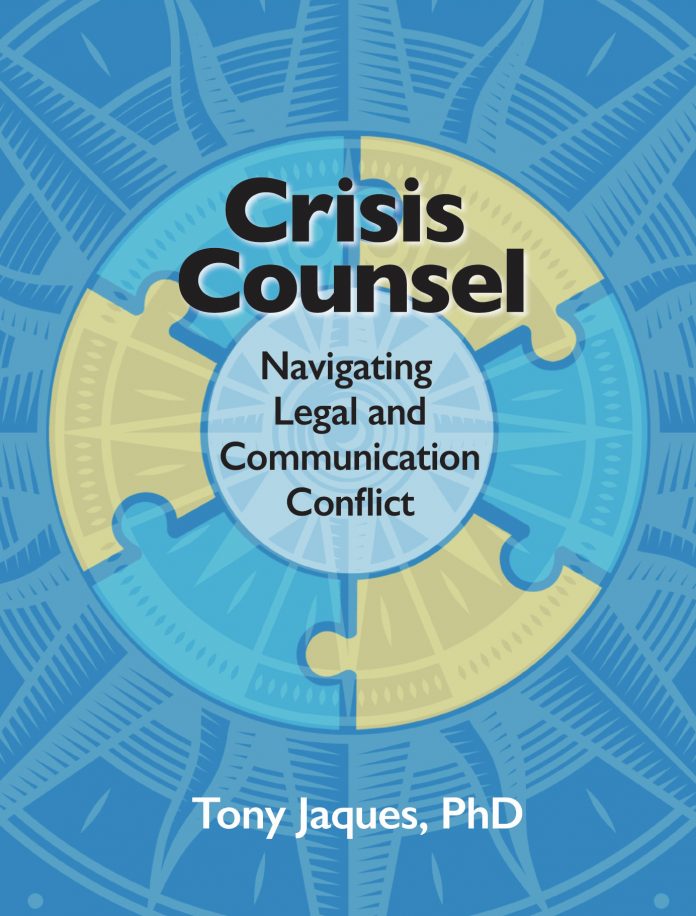
Crisis management is never easy. Difficult decisions need to be made quickly, often without the full facts, often with potentially serious consequences, and often outside your field of experience.
The reality is that while senior managers and leaders may be experienced and well trained in building a business, it is rare they built their career on handling crises—and that’s an experience most would rather avoid. In fact, when a crisis hits is often the worst moment of their professional life, and they are ill-prepared.
There is a veritable library of books and training programs on the tactical basics of crisis response—setting up a crisis management team; developing a manual and protocols; identifying a spokesperson; writing media guidelines; and maybe holding an occasional simulation exercise when someone gets around to it. What’s often missing is training how to make executive decisions under extreme pressure.
A crisis by definition is a low-probability, high-impact event that is likely to seriously impact reputation or the ability to do business. It is characterized by ambiguity of cause, effects, and means of resolution, as well as by a belief that decisions must be made swiftly.
Importantly, a crisis is overlaid by risk and uncertainty, because if there were an obvious and easy way forward, it probably wouldn’t be a crisis.
In a real crisis, the questions are hard and making the right decisions is a tough challenge.
- Shall we speak up or maintain silence?
- Do we admit fault or declare we are not responsible?
- What should we say to the news media?
- Shall we suspend production/recall our product?
- Are we liable to prosecution?
- How do we respond to social media attacks?
- What do we need to tell investors, suppliers, customers, other stakeholders?
- Do we sacrifice individual staff who may have made a mistake?
- Is it appropriate to communicate directly with victims?
- How do we balance what’s legally right with what’s the right thing to do?
- Are we legally required to report to regulators or the stock exchange?
- Should we set up an independent investigation?
- How do we inform and protect employees?
And that’s only a sample. Not every crisis triggers the same questions, but just about every crisis demands decisions in a hurry, when the full facts may not yet be known, and when you are making decisions that could be subject to intense legal, regulatory, or public scrutiny.
Given the tribulations of a crisis, it’s natural—and good practice—that you seek out expert advice.
Communication Advice vs. Legal Advice
You likely will receive input from many quarters, and the task can become harder, not easier, when you must decide between contradictory advice. One of the key areas of disagreement in a crisis is between legal advice and communication advice. For example, when the communicator says, “Tell it all and tell it now,” and the lawyer says, “Let’s wait until we have the full facts. You can’t get into trouble for what you don’t say.”
It generally wouldn’t be smart to adopt either of these extremes. But the challenge remains the same: what to do and say, and how to navigate through conflicting recommendations.
While conflict between legal and communication advice is nothing new—especially in the pressure-cooker environment of a crisis—the lesson here is not to train managers and leaders to be lawyers or crisis experts. Instead, the objective is to promote how to balance consequences and make decisions under pressure.
Communicators, by the nature of their profession, are typically free with their opinions about what to say and why. However, I wanted to understand better what lawyers think is their role in a crisis, in order to help me develop practical guidelines for executives caught in the middle.
To achieve this, I undertook a first-of-a-kind international survey in partnership with reputation management consultancy SenateSHJ and its PROI overseas network to interview experienced crisis lawyers in the United States, Canada, England, Australia, and New Zealand. The full details are reported as a chapter in my new book, “Crisis Counsel: Navigating Legal and Communication Conflict” (Rothstein Publishing, 2020).
When asked which areas are particularly prone to conflict, the lawyers interviewed nominated apologizing, as well as public statements and disclosure. Specifically, they think communicators’ tendency to communicate openly and transparently means they risk disclosing information that may lead to liability or future litigation. The lawyers also were concerned about the lack of legal awareness among communication professionals.
Another perceived area of potential conflict was balancing speed and accuracy. Almost every lawyer emphasized what they saw as the need for certainty before communicating, although communicators know that decisions in a crisis must be made quickly on what is known at the time, which is typically incomplete.
While litigation was identified as a further area prone to conflict, when the lawyers were asked to nominate the main strength they bring to a crisis, the most common response was not their legal expertise but an ability to be calm and predictable.
At the same time, when asked to identify what communicators bring to a crisis, the lawyers’ focus was not on tactical skills, though they broadly recognized the communicators’ ability to develop succinct messages. Instead, the lawyers nominated the communicators’ understanding of stakeholders. As one lawyer commented, “They understand the imperfections of human nature better than lawyers. They understand the gladiatorial nature of media better than lawyers.”
Despite these differences, a striking theme was recognition that both “sides” need to develop a better appreciation of each other’s roles.
Overall, the sense was that improved understanding will lead to greater mutual respect for what lawyers and communicators each can contribute when a crisis strikes. Indeed, several lawyers in the survey stressed the importance of what they called a “hand-in-glove” approach. That was the key, they said, to achieve the best possible outcome for the organization as a whole.
Lessons for Executives
So what can executives learn from this about how to manage conflicting advice in a crisis? A key theme from the research was the reminder that there is a big difference between advising and deciding.
One respondent said, “Lawyers are paid a lot of money to provide the legal input and not to make the calls about communication and other elements of the response. So at the end of the day, the legal input will be just one input that’s evaluated by management when they’re considering how to respond.”
Another added, “It’s important that the client knows my job is to advise, but they don’t have to follow my advice and I’m not offended if they don’t.”
Several also noted there is no “one-size-fits-all” or “cookie-cutter” approach to crises, and that nothing replaces experience and good judgment. However, there was a recognition that it is never easy.
Asked for their specific advice to managers and decision-makers, one said, “Always focus on your stakeholders and the end game. This is sometimes difficult when you’re in the eye of the storm and there is a whirl of activity and interests, both within the organization and in the media.”
Yet the lawyers were clear about the way forward. One observed that it’s not the lawyer’s job, nor the communicator’s job, to determine the values of the organization. “The senior management, the organization, has a set of values, and how you respond demonstrates the values-based decision-making framework you’re operating within. The actions of the organization need to demonstrate that the responses have been developed based on those values.”
Another said, “From a legal point of view, liability alone should not be a bar to doing what’s right. That’s part of being a values-based organization.”
A third put it even more simply: “Trust your instinct—but think about your people first and foremost. If you were the family, client, or consumer involved in the crisis, what would you expect?”
Training Steps
In summary then, what are the training steps for navigating through conflicting advice in a crisis and making the right decisions for your organization and the community?
- Build a relationship and work closely with lawyers, communicators, and other advisors before and during a crisis—and get them to work together.
- Establish an effective Crisis Management Team and exercise realistic scenario simulations on a regular basis.
- Make sure lawyers and communicators are full members of the team and participate in training and simulation exercises.
- Demonstrate leadership in a crisis and enforce governing principles and values.
- Identify and address all stakeholders—internal and external—and keep focused on the end game.
- Embed legal and communication input into risk management or business continuity plans.
- Listen equally to respected lawyers and communicators, but recognize that making hard decisions in response to a crisis is not a popularity contest.
- Remember that just about every crisis has a legal component, but virtually no crisis is ever solely about legal considerations.
These steps won’t avert every crisis, or necessarily avoid all mistakes. After all, you can win in the court of law and still lose disastrously in the court of public opinion.
Yet following these guidelines will help ensure that conflicting advice is properly managed, and that you set yourself on the path to making the best decisions in the interests of all stakeholders and the community.
Adapted from “Crisis Counsel: Navigating Legal and Communication Conflict” by Dr. Tony Jaques (Rothstein Publishing, 2020). For more information, visit: https://www.amazon.com/dp/194448065X?ref_=pe_3052080_397514860
Tony Jaques, Ph.D., is an expert in issue, risk, and crisis management who worked for more than 20 years as Asia-Pacific issue and crisis manager for a major American multinational. He is now managing director of Melbourne-based Issue Outcomes P/L (www.issueoutcomes.com.au), which specializes in developing and evaluating corporate response systems. His latest book is “Crisis Counsel: Navigating Legal and Communication Conflict” (Rothstein Publishing, 2020).



